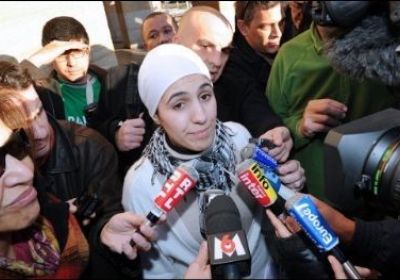Thousands of workers across France protested on May 27 against President Nicholas Sarkozy’s planned attacked on the French pension system.
The protests were called by a coalition of union confederations, including the General Confederation of Labour (CGT); French Democratic Confederation of Labour (CFDT); United Union Federation (FSU); National Union of Autonomous Unions and Solidaires. They came after the government failed to withdraw or modify the planned changes to the pension system following protests on March 23 and May 1.
-
-
 Laws punishing women for wearing the burqa and the niqab in public were passed by the Belgian lower house of parliament on April 29. A similar law has been discussed by French President Nicholas Sarkozy, and the French National Assembly passed a non-binding resolution in favour of a ban on May 11. These laws have been pushed by right-wing governments on the basis of security needs and protecting national identity, but the laws have also been justified as promoting equality for women. On this basis, the laws have received support from sections of the left and the feminist movement.
Laws punishing women for wearing the burqa and the niqab in public were passed by the Belgian lower house of parliament on April 29. A similar law has been discussed by French President Nicholas Sarkozy, and the French National Assembly passed a non-binding resolution in favour of a ban on May 11. These laws have been pushed by right-wing governments on the basis of security needs and protecting national identity, but the laws have also been justified as promoting equality for women. On this basis, the laws have received support from sections of the left and the feminist movement. -
French voters have dealt a blow to right-wing President Nicolas Sarkozy in the first and second rounds of voting in the French regional elections. The opposition Socialist Party (PS) expanded its control of regional presidencies to 23 of the 26 regions, based on a record voting percentage in the second round on March 21. There were mixed results for parties to the left of the PS, and also a resurgence of the far-right National Front (FN). The elections have been marred by record-low voter turnout, with 46.5% and 51% of voters taking part in the two rounds.
-
In May and June of 1968, a movement erupted in France that threatened not just the survival of the government of President Charles De Gaulle but the system that it represented capitalism.
-
An expanded form of this article first appeared in Revista Corriente Alterna. The translation of this extract is by British group, Socialist Resistance.
-
On January 11, French Prime Minister Francois Fillon announced what amounts to a ban on the commercial growing of MON810, a type of genetically modified corn. MON810, marketed by the US biotech company Monsanto, is the only GM crop grown commercially in France.
-
A nationwide train strike that had crippled France for nine days in protest against right-wing President Nicholas Sarkozy’s attack on the rail workers’ pension system began to end on November 23. News agencies reported that day that rail workers were voting throughout the country to return to work.
-
Striking French rail workers voted on November 16 to extend the open-ended strike begun three days earlier, according to a Reuters report that day. This continues the campaign begun one month earlier, when strikes across France on October 18 paralysed the country’s rail, bus and subway systems for 24 hours in the first major confrontation between unions and President Nicolas Sarkozy.
-
The election of Nicolas Sarkozy as Frances president in April and the landslide to the conservatives in the first round of the parliamentary elections on June 10, described in France as the blue wave, were widely presented in the Australian capitalist media as a dramatic shift to the right in French political life. They are all too keen to wipe out last years images of French workers and students successfully resisting anti-worker laws, something they only grudgingly reported on in the first place.
-
This is an abridged version of a motion adopted by the national leadership of Frances Revolutionary Communist League (LCR).
-
The French presidential and parliamentary elections produced very contradictory results for the broadly defined radical left. Its collective vote of a little less than 9% in the presidential poll, while large compared to other industrialised countries, was down from 15% in 2002. However the Revolutionary Communist League (LCR) bucked the trend and cemented its position as the most credible voice of the anti-capitalist left.
-
The first striking thing about the initial round of the French presidential election, held on April 22, was the extraordinarily high turnout nearly 85%. You have to go back to the 1965 election to find a slightly higher figure. This was a sign of the increasing politicisation of French society in recent years, as was the fact that more than 3 million new electors registered to vote.